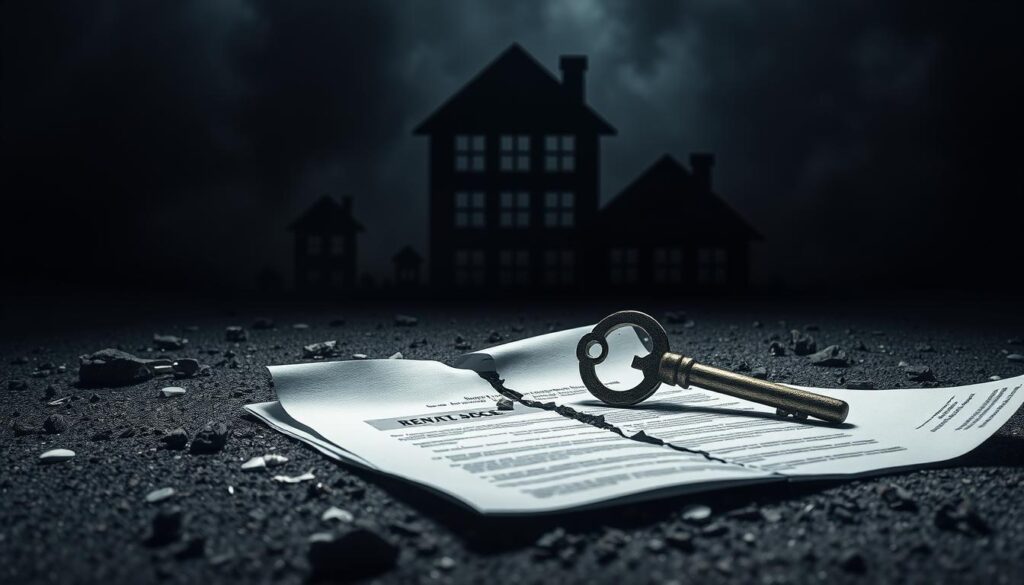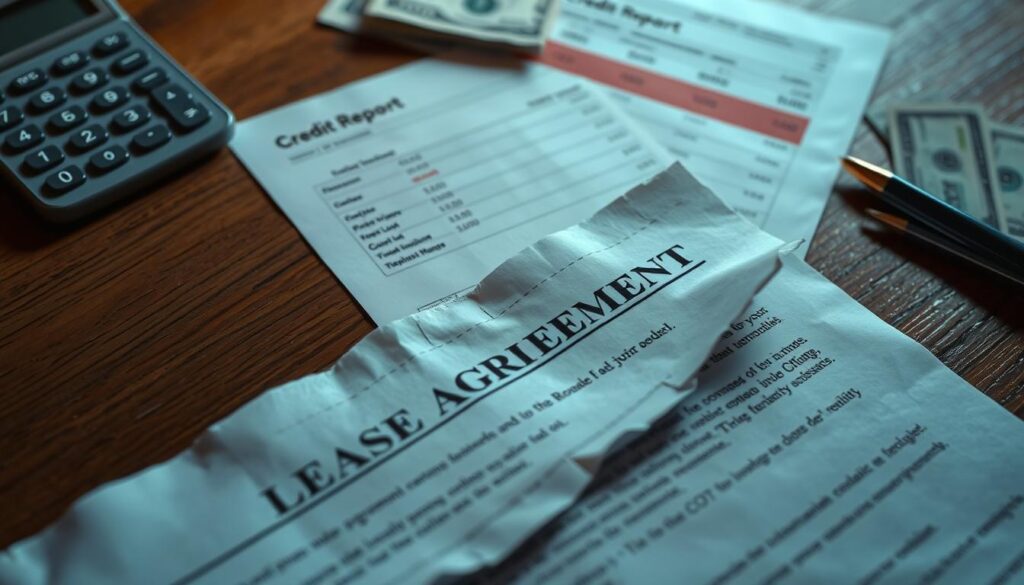Breaking a lease can be tough, especially when life throws you a curveball. It’s vital to know how this decision might impact your credit score. Let’s explore the potential consequences and strategies to protect your creditworthiness.
We’ll examine lease agreements in detail and discuss ways to lessen credit damage. This guide will help you navigate the complexities of early lease termination with confidence.
Key Takeaways
- Terminating a lease can have negative effects on your credit score, including potential late payment or collections reporting by the landlord.
- Breach of contract and early lease termination can lead to penalties, fees, and legal consequences that can further damage your credit.
- Understanding the terms of your lease agreement and communicating transparently with your landlord are crucial steps to minimizing the credit impact of a premature lease exit.
- Negotiating with your landlord, building a positive rental history, and being proactive in addressing any lease violations can help mitigate the credit damage.
- Seeking legal guidance and familiarizing yourself with state-specific landlord-tenant laws can provide valuable insights into your rights and options.
The Consequences of Early Lease Termination
Ending a lease early can hurt your credit score. Landlords may report a breach of contract to credit bureaus. This can make future housing and loans harder to get.
A broken rental agreement can negatively impact your credit history. It may affect your ability to secure financial services too.
Potential Credit Score Impact
An early lease termination can lead to a lower credit score. Landlords might report the violation to credit agencies.
This can make it harder to get mortgages or credit cards. It may also affect your ability to rent in the future.
Breach of Contract Implications
Ending a lease early may leave you responsible for remaining rent and fees. These financial obligations can harm your creditworthiness if left unpaid.
Unpaid debts may be reported to credit bureaus as delinquent payments. This can further damage your credit score.
“Terminating a lease can have serious consequences for your credit score and financial well-being. It’s crucial to understand the potential impact before making this decision.”
Knowing the risks of early lease termination helps protect your credit score. It also maintains a good rental history.
Talk to your landlord before making any decisions. This can help reduce potential credit score and financial impacts.
Understanding Lease Agreements
Carefully review your rental agreement before signing. Check for early termination clauses, notice periods, and potential penalties. Knowing your lease can help avoid credit-damaging violations.
Lease agreements outline tenant and landlord rights and responsibilities. Understanding these details reveals how ending a lease early affects your credit. Review the contract to grasp the impact on your credit profile.
Key elements to consider in your lease include:
- Early Termination Clauses: Identify provisions outlining the process and penalties for ending the lease early.
- Notice Period: Determine the advance notice required to avoid extra charges or penalties.
- Fees and Penalties: Understand financial implications like termination fees or security deposit forfeiture.
- Landlord Reporting Practices: Ask about the landlord’s policy on reporting lease violations to credit bureaus.
Knowing your lease terms helps you make smart decisions about your rental. It allows you to take steps to protect your credit score if needed.

| Lease Agreement Elements | Key Considerations |
|---|---|
| Early Termination Clauses | Understand the process and penalties for ending the lease before the agreed-upon duration. |
| Notice Period | Determine the amount of advance notice required to terminate the lease without facing additional charges or penalties. |
| Fees and Penalties | Understand the financial implications, such as any early termination fees or security deposit forfeiture, that may result from ending the lease prematurely. |
| Landlord Reporting Practices | Inquire about the landlord’s reporting policies regarding lease violations to credit bureaus, as this can directly impact your credit score. |
Factors Affecting Credit Penalties
Lease termination can impact your credit score. The severity of the violation and landlord’s reporting practices are key factors. Understanding these can help you anticipate potential credit penalties.
Severity of Violation
The reason for breaking a lease influences credit consequences. Legitimate hardships may lead to more understanding from landlords. They might be less likely to report these to credit agencies.
Non-payment or intentional contract breaches are seen as serious offenses. Landlords are more likely to report these, resulting in harsher credit penalties.
Landlord’s Reporting Practices
Landlord reporting practices affect credit impact. Some may not report minor violations, focusing on resolving issues with tenants. Others might have strict policies, reporting all lease terminations.
Knowing your landlord’s approach helps predict potential credit implications. This knowledge can guide your actions and decisions.
| Factors | Impact on Credit |
|---|---|
| Reason for Termination | Legitimate hardship = less severe, Non-payment/breach = more severe |
| Landlord’s Reporting Practices | Lenient reporting = less impact, Strict reporting = more impact |
Consider these factors to understand potential credit consequences of lease termination. Take steps to protect your credit score. Being informed helps you make better decisions.
Does Terminating a Lease Affect Credit
Breaking a lease can hurt your credit score. Your landlord might report this contract breach to credit bureaus. This negative entry could lower your credit score significantly.
A poor credit score makes getting new credit tough. It can also hinder renting another property or landing certain jobs. Landlords often check credit reports when screening tenants.
The impact’s severity depends on your landlord’s reporting practices. It also relies on your lease agreement’s specific terms. Some landlords might not report the violation.
They may work with you to find a solution. This could minimize the damage to your credit score.
| Scenario | Credit Impact |
|---|---|
| Terminating a lease due to a legitimate hardship | Potentially less severe, if the landlord is understanding and willing to work with you |
| Breaking a lease without a valid reason | More severe, as the landlord is more likely to report the violation to credit bureaus |
Know your lease agreement’s terms thoroughly. Talk openly with your landlord if you need to end the contract early. Good planning and negotiation can help protect your credit score.
Mitigating Credit Damage
Early lease termination can hurt your credit score. Act quickly to minimize the impact. Negotiate with your landlord and explore alternatives to reduce credit penalties.
Negotiating with the Landlord
Talk to your landlord about your situation. Be honest and present a plan. Your landlord may be willing to compromise on credit penalties.
Discuss alternatives to a full lease termination that affects credit. A cooperative approach can lead to a mutually beneficial solution.
Timely Communication and Transparency
Open communication is key when facing a potential lease violation. Be upfront about your circumstances. Provide necessary documentation to support your case.
Work with your landlord to find a resolution. Your proactive approach shows commitment to solving the issue.
“Communicating with your landlord and being transparent about your situation can go a long way in minimizing the credit damage from an early lease termination.”
Early action can help negotiate a better outcome. It may reduce the long-term credit penalties associated with a lease violation.
A cooperative approach is crucial. It can protect your credit score during challenging rental situations.
Rental Agreement Breach Consequences
Breaking a rental agreement can have serious effects beyond hurting your credit score. You might have to pay remaining rent, face eviction, or be sued. Knowing these consequences helps you make better choices and explore other options.
A major result of breaching your lease is damage to your credit. Landlords often report violations to credit bureaus. This can make your credit score drop a lot. Bad credit can make it hard to rent again or get loans.
Contract breaches can also lead to financial penalties. Landlords may try to get back unpaid rent and other costs. They might even sue you for the rest of the lease term. This can add up to a big financial burden.
Eviction is another possible outcome of breaking your rental agreement. If you don’t fix the problem, your landlord may start eviction proceedings. An eviction record can make it tough to find housing or jobs in the future.
| Consequence | Description |
|---|---|
| Credit Score Damage | Landlords often report lease violations to credit bureaus, leading to a significant drop in your credit score. |
| Financial Penalties | Landlords may seek to recover outstanding rent, repair costs, and even sue for the remaining term of the lease. |
| Eviction | Failure to rectify a violation or reach an agreement with the landlord may result in the initiation of the eviction process. |
To avoid these problems, read your lease carefully. Talk openly with your landlord if issues come up. Look into all other options before breaking your agreement. This can help protect your credit and finances.

Protecting Your Credit Score
Two key strategies protect your credit score: careful lease review and positive rental history. Understanding your lease terms helps avoid unexpected credit impacts. These strategies can safeguard your financial well-being during early lease termination.
Careful Lease Review
Always review the fine print before signing a lease. Look for clauses about reporting lease violations to credit bureaus. Check for penalties related to early termination.
This knowledge empowers you to make informed decisions. It also helps you take steps to protect your credit score.
Building Good Rental History
A positive rental history can offset potential credit challenges. Make on-time payments consistently. Maintain a good relationship with your landlord.
This track record shows your reliability as a tenant. It can help minimize the credit impact if you need to terminate your lease early.
Understanding your lease agreement is crucial for credit protection. Building a strong rental history is equally important. These actions can help you navigate early lease termination more smoothly.
Early Termination Fees and Costs
Ending a lease early can lead to various financial obligations. These may include remaining rent, termination fees, and property damage costs. Such expenses can pile up quickly, affecting your credit score.
Remaining rent is often a major cost when terminating a lease early. Your rental agreement may require you to pay rent for the full lease term. This can strain your budget and potentially harm your credit if not managed well.
Early termination fees are another possible expense. These fees are usually stated in the lease agreement. They help landlords cover the costs of finding a new tenant. The fee amount can vary, so it’s important to check your rental contract.
You might also be responsible for property damages beyond normal wear and tear. These repair costs can add to your financial burden. They may be reported to credit agencies, potentially affecting your credit score.
To lessen the early lease termination impact and rental termination credit effects, take these steps. Review your lease agreement carefully. Talk openly with your landlord. Explore all options for ending your lease responsibly.
| Early Termination Costs | Average Cost Range |
|---|---|
| Remaining Rent | $2,000 – $5,000 |
| Early Termination Fee | $500 – $2,000 |
| Damages to Property | $200 – $1,000 |
The table shows potential costs of early lease termination. Keep in mind that these figures can vary widely. They depend on your rental agreement, lease length, and the property’s condition when you leave.

Landlord-Tenant Laws and Regulations
Rental agreements are governed by crucial laws and regulations. These rules shape the landlord-tenant relationship. Understanding them is key to avoiding serious consequences.
State-Specific Requirements
Laws about renting vary widely across states. They outline rights and duties for both landlords and tenants. These rules also cover what happens if agreements are broken.
Tenants should know their local laws before signing a lease. This knowledge helps when considering early termination or facing potential penalties.
Some states require specific notice periods for ending leases. Others allow landlords to charge high fees for breaking agreements. Many states protect tenants from unfair evictions or credit reporting practices.
| State | Early Termination Notice Period | Maximum Termination Fee | Credit Reporting Restrictions |
|---|---|---|---|
| California | 30 days | 2 months’ rent | Landlords must provide written notice before reporting to credit agencies |
| New York | 60 days | 1 month’s rent | Landlords cannot report missed payments until 30 days after due date |
| Texas | 30 days | 3 months’ rent | No state-specific restrictions on credit reporting |
Knowing your state’s rules helps manage potential lease-breaking consequences. It can protect your credit score and rental history. Being informed empowers you to take the right steps.
Credit Reporting for Lease Violations
Landlords can report lease violations to credit bureaus. This can harm a tenant’s credit report and creditworthiness. Understanding how lease defaults are reported is vital for tenants.
Landlords may report lease defaults or credit penalties to credit agencies. This can lower a tenant’s credit score. It may also make future housing and loans harder to get.
The impact of a reported lease violation varies. It depends on the breach’s severity, landlord’s reporting practices, and tenant’s credit history. A single default can significantly drop a credit score.
| Factors Affecting Credit Reporting for Lease Violations | Description |
|---|---|
| Severity of Violation | The more severe the breach of the lease agreement, the more negatively it may be reported to credit agencies. |
| Landlord’s Reporting Practices | Some landlords may be more diligent in reporting lease defaults than others, leading to varying levels of credit impact. |
| Tenant’s Credit History | Tenants with an otherwise strong credit history may experience less damage to their creditworthiness compared to those with a history of lease violations or other negative credit events. |
Tenants can protect their credit by talking openly with landlords. They should negotiate fair terms for early lease termination. Resolving lease defaults quickly is also important.

Tenants should understand how lease violations affect credit reports. Taking action to address issues can protect their finances. This is crucial even when life changes force lease termination.
Alternatives to Breaking a Lease
Breaking a lease early can hurt your credit score. It’s important to look at other options first. There are several ways to avoid the negative effects of ending a lease too soon.
Subletting is one option to consider. If allowed, you can find someone to take over your lease. This helps you avoid damaging your credit while moving out.
Another choice is finding a replacement tenant. This can help you dodge financial and credit penalties. You’ll need your landlord’s approval, so good communication is key.
Try negotiating with your landlord for an early termination agreement. Some landlords may reduce penalties if you give enough notice. Explain your situation clearly to reach a better outcome.
Exploring these options can help protect your credit. A proactive approach and willingness to compromise often lead to the best results.
| Alternative | Description | Potential Benefits |
|---|---|---|
| Subletting | Finding a suitable sublessee to take over the remaining lease term | Avoids direct early lease termination impact on credit, allows transition out of property |
| Replacement Tenant | Locating a new tenant to assume the lease | Can help avoid financial and credit-related penalties associated with premature lease exit credit |
| Negotiation with Landlord | Discussing an early lease termination agreement with the landlord | Potential to minimize early lease termination impact on credit, achieve a more amicable separation |
Rebuilding Credit After Lease Termination
Lease termination can hurt your credit, but you can take steps to rebuild it. Start by paying off any remaining lease obligations on time. This shows you’re serious about managing your finances responsibly.
Check your credit report for errors from your former landlord. Dispute any inaccurate information you find. Correct details are vital for rebuilding your credit profile.
Focus on creating a positive rental history with new landlords. Pay rent on time and keep the property in good shape. This proves you’re a reliable tenant.
With effort and time, you can improve your credit score. Stay focused on your credit recovery plan. Responsible financial habits will help boost your overall creditworthiness.

